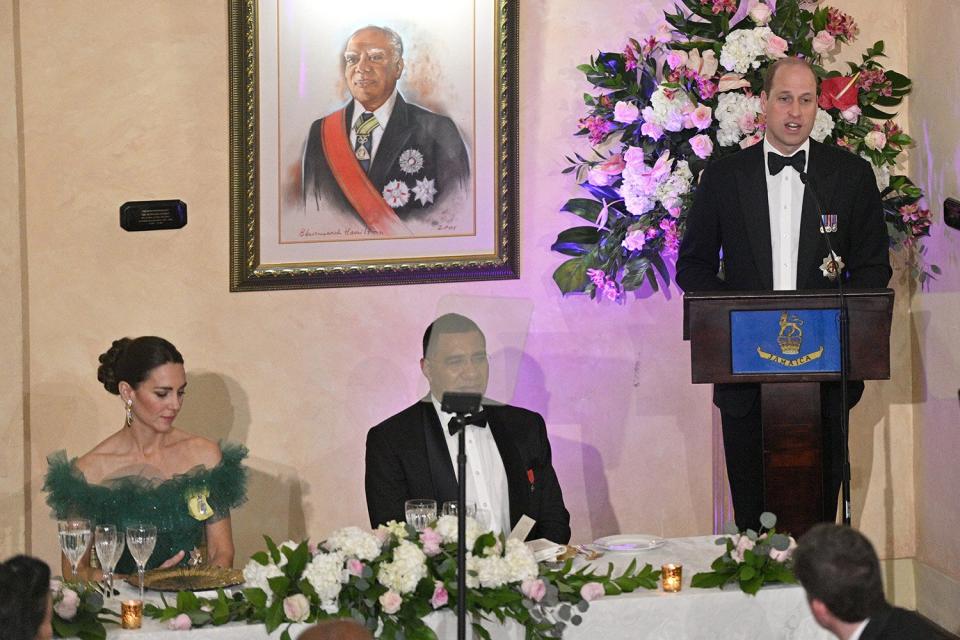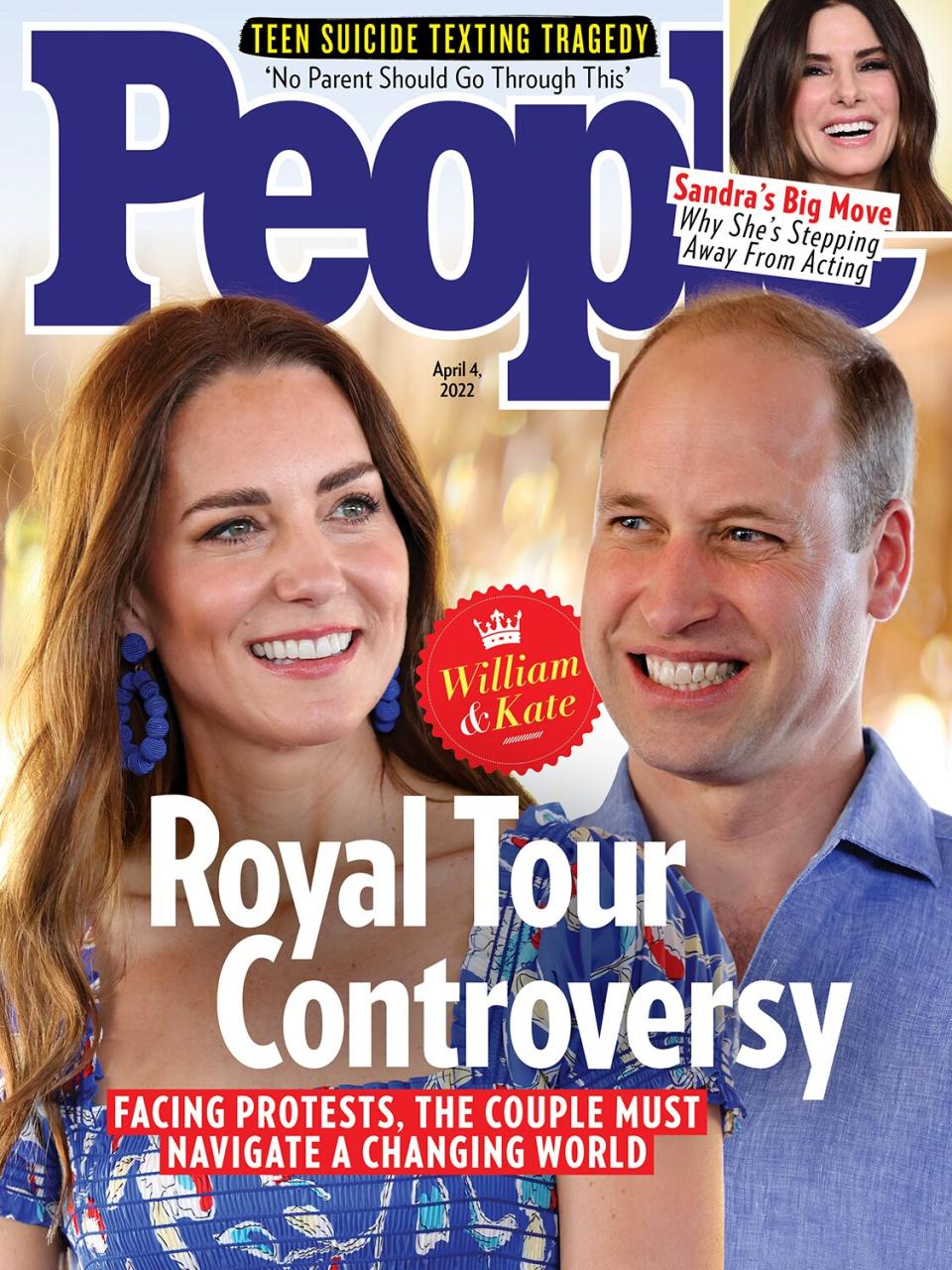Why Prince William Needs to Do More Than Express His 'Sorrow' Over the Slave Trade

- Oops!Something went wrong.Please try again later.
- Oops!Something went wrong.Please try again later.
Tim Rooke/Shutterstock Prince William
Prince William needs to do more than express his "profound sorrow" over Britain's role in the trans-Atlantic slave trade: He needs to take steps to repair it, says Hakim Adi from the University of Chichester in England.
"It's meaningless, really," the Professor of the History of Africa and the African Diaspora tells PEOPLE about the comments made by William at the residence of the Governor-General of Jamaica on March 23, during which the Duke of Cambridge, 39, also described slavery as "abhorrent."
Continues Adi, "One needs to look at the whole context of the royal tour. The whole reason for the visit seems to be to maintain the colonial ties between Britain and the Caribbean, particularly in the wake of the efforts of Barbados and others to become republics."
"The whole tour is designed to reinforce the relationship founded on slavery and colonialism, so it's meaningless," he says. "It has sought to highlight this history, but there's no sense of repair or attempt at a repair."
William's comments at King's House came on the second leg of his Caribbean tour with Kate Middleton last week. During his speech, he also praised the "determination, courage, and fortitude" of the Jamaican people in forging their own future since gaining independence from the U.K. in August 1962, and paid tribute to high profile Jamaicans, including reggae musician Bob Marley and England soccer star Raheem Sterling.

Samir Hussein/WireImage Catherine, Duchess of Cambridge and Prime Minister of Jamaica Andrew Holness watch as Prince William, Duke of Cambridge speaks on stage during a dinner hosted by the Governor General of Jamaica at King's House
His comments followed those of his father, Prince Charles, 73, who denounced the "appalling atrocity of slavery, which forever stains our history," in a speech he made in Barbados last year at the country's transition ceremony, which saw the island nation remove Queen Elizabeth as head of state and swear in its first president.
At the end of the couple's eight-day trip, William further addressed the issue, issuing an unprecedented statement about the roiling controversy surrounding their visit to the Caribbean countries. "I know that this tour has brought into even sharper focus questions about the past and the future," he said on March 26, the day he and Kate flew back home to the U.K. "In Belize, Jamaica and The Bahamas that future is for the people to decide upon.
The British royal family played a key role in the trans-Atlantic slave trade, which began in 1562 when Captain John Hawkins was given a green light to carry enslaved Africans in his cargo by Queen Elizabeth I.
A hundred years later, King Charles II granted a charter to the Company of Royal Adventurers of England, led by his younger brother James (later King James II). This granted the company a monopoly over the transportation of slaves from West Africa to the English colonies in the Caribbean and North America, and explicitly sanctioned "the buying and selling, bartering and exchanging of, for, and with, any negro slaves."
Largely thanks to its royal connections, the company — which changed its name to the Royal African Company in 1672 — was at the forefront of a rapid expansion in slave trading, with British ships believed to have transported 254,000 Africans across the Atlantic in chains between 1663 and the end of the 17th century to work on sugar, cotton and tobacco plantations.
In 1713, the royal connection became yet more lucrative, when Queen Anne signed the Treaty of Utrecht with King Philip V of Spain. This gave Britain the "Assiento de Negros" ("Agreement of Blacks"), an exclusive contract to trade slaves to the Spanish colonies in the Americas for 30 years.
The U.K. Government then sold the contract to the South Sea Company for $9.8 million, with Queen Anne securing more than 20% of the stock for herself (worth $263 million today).

Britain continued to play the lead role in the African slave trade throughout the 18th century. Despite the enormous wealth it generated, however, public opinion gradually turned and in 1807 the British Parliament outlawed the slave trade.
Slavery itself was later made completely illegal in the U.K. and most British colonies in 1833 through the Slavery Abolition Act.
Yet it wasn't a completely clean break: To bring the trade to a halt, the U.K. government paid the equivalent of $330 million in compensation to the slave-trading companies — a debt the British treasury did not fully repay until 2015.
"Every single monarch from Elizabeth I to George IV was connected with human trafficking — every single one," says Adi.
"Those who have come after that period have benefited from that wealth, which was accumulated both from human trafficking and the subsequent colonial rule — as are all the major institutions in the U.K., like the Church of England and the Bank of England. All of them are connected to that period of exploitation and plundering of the world's humanity."
It is because of this historic link that Adi believes the royals now need to do far more than express their sorrow.
"If you're really concerned about the history, then, as a beneficiary of it, you should make a stand and encourage others to make a stand," he says.
"The people calling for an apology and reparations is a legitimate thing to be asking, but the U.K. government and the monarchy are doing the opposite. They are calling for the continuation of these colonial ties and ties of exploitation.
"Actions speak louder than words, and [William's] actions are to maintain that historic relationship."

